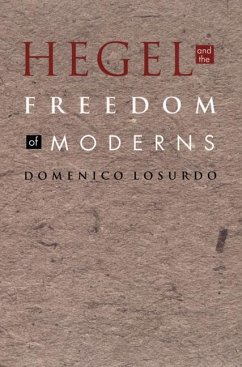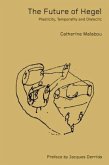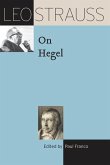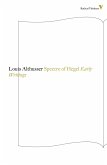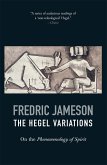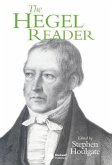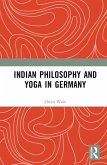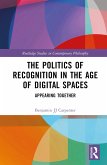- Broschiertes Buch
- Merkliste
- Auf die Merkliste
- Bewerten Bewerten
- Teilen
- Produkt teilen
- Produkterinnerung
- Produkterinnerung
Translated into English for the first time, this work portrays a different side of Hegel -- not just as a philosopher preoccupied with abstract ideas but a man deeply enmeshed and active in the pressing, concrete political issues of his time
Andere Kunden interessierten sich auch für
![The Future of Hegel The Future of Hegel]() Catherine MalabouThe Future of Hegel56,99 €
Catherine MalabouThe Future of Hegel56,99 €![Leo Strauss on Hegel Leo Strauss on Hegel]() Leo StraussLeo Strauss on Hegel40,99 €
Leo StraussLeo Strauss on Hegel40,99 €![The Spectre Of Hegel The Spectre Of Hegel]() Louis AlthusserThe Spectre Of Hegel25,99 €
Louis AlthusserThe Spectre Of Hegel25,99 €![The Hegel Variations The Hegel Variations]() Fredric JamesonThe Hegel Variations17,99 €
Fredric JamesonThe Hegel Variations17,99 €![The Hegel Reader The Hegel Reader]() Georg Wilhelm Friedrich HegelThe Hegel Reader70,99 €
Georg Wilhelm Friedrich HegelThe Hegel Reader70,99 €![Indian Philosophy and Yoga in Germany Indian Philosophy and Yoga in Germany]() Owen WareIndian Philosophy and Yoga in Germany152,99 €
Owen WareIndian Philosophy and Yoga in Germany152,99 €![The Politics of Recognition in the Age of Digital Spaces The Politics of Recognition in the Age of Digital Spaces]() Benjamin JJ CarpenterThe Politics of Recognition in the Age of Digital Spaces152,99 €
Benjamin JJ CarpenterThe Politics of Recognition in the Age of Digital Spaces152,99 €-
-
-
Translated into English for the first time, this work portrays a different side of Hegel -- not just as a philosopher preoccupied with abstract ideas but a man deeply enmeshed and active in the pressing, concrete political issues of his time
Hinweis: Dieser Artikel kann nur an eine deutsche Lieferadresse ausgeliefert werden.
Hinweis: Dieser Artikel kann nur an eine deutsche Lieferadresse ausgeliefert werden.
Produktdetails
- Produktdetails
- Post-Contemporary Interventions
- Verlag: Duke University Press
- Seitenzahl: 400
- Erscheinungstermin: 18. August 2004
- Englisch
- Abmessung: 235mm x 154mm x 27mm
- Gewicht: 564g
- ISBN-13: 9780822332916
- ISBN-10: 0822332914
- Artikelnr.: 20955307
- Herstellerkennzeichnung
- Libri GmbH
- Europaallee 1
- 36244 Bad Hersfeld
- gpsr@libri.de
- Post-Contemporary Interventions
- Verlag: Duke University Press
- Seitenzahl: 400
- Erscheinungstermin: 18. August 2004
- Englisch
- Abmessung: 235mm x 154mm x 27mm
- Gewicht: 564g
- ISBN-13: 9780822332916
- ISBN-10: 0822332914
- Artikelnr.: 20955307
- Herstellerkennzeichnung
- Libri GmbH
- Europaallee 1
- 36244 Bad Hersfeld
- gpsr@libri.de
Domenico Losurdo is Professor of Philosophy at the University of Urbino and President of the International Hegel-Marx Society for Dialectical Thought. He is the author of numerous books in Italian.
Translators’ Note xii
Hegel Source Abbreviations xv
Preface to the Italian Edition xvii
ONE. A Liberal, Secret Hegel?
> I. Searching for the “Authentic” Hegel 3
1. Censorship and Self-Censorship 3
2. Linguistic Self-Censorship and Theoretical Compromise 9
3. Private Dimension and Philosophical Dimension 14
4. Hegel...a Mason? 16
5. Esoteric and Exoteric History 20
6. Philosophical Arguments and Political “Facts” 23
7. An Interpretative “Misunderstanding” or a Real Contradiction? 26
II. The Philosophies of Right: A Turning Point or Continuity 32
1. Reason and Actuality 32
2. The Power of Sovereign 39
3. One Turn, Two Turns, or No Turn at All 46
TWO. Hegel, Marx, and the Liberal Tradition
III. Contractualism and the Modern State 53
1. Anticontractualism=Antiliberalism? 53
2. Contractualism and the Doctrine of Natural Law 56
3. Liberal Anticontractualism
> 4. The Celebration of Nature and the Ideology of Reactionism 60
5. Hegel and Feudal, Proto-Bourgeois Contractualism 64
6. Contractualism and the Modern State 67
IV Conservative or Liberal? A False Dilemma 71
1. Bobbio’s Dilemma 71
2. Authority and Freedom 72
3. State and Individual 78
4. The Right to Resistance 83
5. The Right of Extreme Need and Individual Rights 87
6. Formal and Substantive Freedom 90
7. Interpretative Categories and Ideological Presuppositions 92
V Hegel and the Liberal Tradition: Two Opposing Interpretations of History
96
1. Hegel and Revolutions 96
2. Revolutions from the Bottom-Up or from the Top-Down 100
3. Revolution According to the Liberal Tradition 103
4. Patricians and Plebeians 107
5. Monarchy and Republic 111
6. The Repression of the Aristocracy and the March Toward Freedom 113
7. Anglophobia and Anglophilia 116
8. Hegel, England, and the Liberal Tradition 118
9. Equality and Freedom 120
VI The Intellectual, Property, and the Social Question 124
1. Theoretical Categories and Immediate Political Options 124
2. The Individual and Institutions 128
3. Institutions and the Social Question 131
4. Labor and Otium 133
5. Intellectuals and Property-Owners 138
6. Property and Political Representations 141
7. Intellectuals and Craftsmen 142
8. A Banausic, Plebeian Hegel? 145
9. The Social Question and Industrial Society 148
THREE. Legitimacy and Contradictions of Modernity
VII Right, Violence, and Notrecht 153
1. War and the Right to Property: Hegel and Locke 153
2. From the Ius Necessitatis to the Right of Extreme Need 155
3. The Contradictions of Modern Economic Development 157
4. Notrecht and Self-Defense: Locke, Fichte, and Hegel 160
5. “Negative Judgment,””Negatively Infinite Judgment,” and “Rebellion” 163
6. Notrecht, Ancien Regime, and Modernity 166
7. The Starving Man and the Slave 169
8. Ius Necessitatis, Ius Resistentiae, Notrecht 171
9. The Conflicts of Right with Moral Intention and Extreme Need 172
10. An Unsolved Problem 177
VII “Agora” and “Schole”: Rousseau, Hegel, and the Liberal Tradition 180
1. The Image of Ancient Times in France and Germany 180
2. Cynics, Monks, Quakers, Anabaptist, and Sansculottes 181
3. Rousseau, the “Poor People’s Grudge,” and Jacobinism 183
4. Politics and Economics in Rousseau and Hegel 186
5. The Social Question and Taxation 189
6. State, Contract, and Joint-Stock Company 193
7. Christianity, Human Rights, and the Community of Citoyens 195
8. The Liberal Tradition and Criticism of Rousseau and Hegel 199
9. Defense of the Individual and Criticism of Liberalism 200
IX School, Division of Labor, and Modern Man’s Freedom 204
1. School, State, and the French Revolution 204
2. Compulsory Education and Freedom of Conscience 206
3. School, State, Church, and Family 210
4. The Rights of Children 213
5. School, Stability, and Social Mobility 215
6. Professions and the Division of Labor 220
7. Division of Labor and Banality of Modernity: Schelling, Schopenhauer,
and Nietzsche 222
X Moral Tension and the Primacy of Politics 225
2. Inconclusiveness and Narcissism in Moral-Religious Precepts 226
3. Modern World and the Restriction of Moral Sphere 228
4. Hegel and Kant 230
5. Hegel, Schleiermach, and the Liberal Tradition 231
6. Hegel, Burke, and Neo-Aristotelian Conservatism 234
7. Hegel, Aristotle, and the Rejection of Solipsistic Escape 237
8. The French Revolution and the Celebration of Ethicality 238
9. Morality, Ethically, and Modern Freedom 241
10. Hegel’s Ethical Model and Contemporary Actuality 243
XI Legitimacy of the Modern and Rationality of the Actual 246
1. The “Querelle de Anciens, des Modernes,” . . and of the Ancient Germans
246
2. Rejection of Modernity, Cult of Heroes, and Anti-Hegelian Polemic 247
3. Kant, Kleist, Schopenhauer, and Nietzsche 250
4. Modernity and the Uneasiness of Liberal Tradition 253
5. Philistinism, Statism, and Modern Standardization 256
6. The Rationality of the Actual and the Difficult Balance between
Legitimation and Criticism of Modernity 260
FOUR. The Western World, Liberalism, and the Interpretation of Hegel’s
Thought
XII The Second Thirty Years War and the “Philosophical Crusade” against
Germany 267
1. Germans, “Goths,” “Huns,” and “Vandals” 267
2. The Great Western Purge 268
3. The Transformation of the Liberal Western World 272
4. An Imaginary Western World, an Imaginary Germany 276
5. Hegel Faces the Western Tribunal 279
6. Ilting and the Liberal Rehabilitation of Hegel 282
7. Lukacs and the Burden of National Stereotypes 286
XII Liberalism, Conservatism, the French Revolution, and Classic German
Philosophy 290
1. Allegmeinheit and Egalite 290
2. The English Origins of German Conservatism 292
3. A Selective Anglophilia 296
4. Tracing the Origins of Social Darwinism and Fascist Ideology 297
5. Beyond National Stereotypes 299
6. Burke and the History of European Liberalism 300
7. Burke’s School of Thought and Classic German Philosophy 302
8. Hegel and the Legacy of t
Hegel Source Abbreviations xv
Preface to the Italian Edition xvii
ONE. A Liberal, Secret Hegel?
> I. Searching for the “Authentic” Hegel 3
1. Censorship and Self-Censorship 3
2. Linguistic Self-Censorship and Theoretical Compromise 9
3. Private Dimension and Philosophical Dimension 14
4. Hegel...a Mason? 16
5. Esoteric and Exoteric History 20
6. Philosophical Arguments and Political “Facts” 23
7. An Interpretative “Misunderstanding” or a Real Contradiction? 26
II. The Philosophies of Right: A Turning Point or Continuity 32
1. Reason and Actuality 32
2. The Power of Sovereign 39
3. One Turn, Two Turns, or No Turn at All 46
TWO. Hegel, Marx, and the Liberal Tradition
III. Contractualism and the Modern State 53
1. Anticontractualism=Antiliberalism? 53
2. Contractualism and the Doctrine of Natural Law 56
3. Liberal Anticontractualism
> 4. The Celebration of Nature and the Ideology of Reactionism 60
5. Hegel and Feudal, Proto-Bourgeois Contractualism 64
6. Contractualism and the Modern State 67
IV Conservative or Liberal? A False Dilemma 71
1. Bobbio’s Dilemma 71
2. Authority and Freedom 72
3. State and Individual 78
4. The Right to Resistance 83
5. The Right of Extreme Need and Individual Rights 87
6. Formal and Substantive Freedom 90
7. Interpretative Categories and Ideological Presuppositions 92
V Hegel and the Liberal Tradition: Two Opposing Interpretations of History
96
1. Hegel and Revolutions 96
2. Revolutions from the Bottom-Up or from the Top-Down 100
3. Revolution According to the Liberal Tradition 103
4. Patricians and Plebeians 107
5. Monarchy and Republic 111
6. The Repression of the Aristocracy and the March Toward Freedom 113
7. Anglophobia and Anglophilia 116
8. Hegel, England, and the Liberal Tradition 118
9. Equality and Freedom 120
VI The Intellectual, Property, and the Social Question 124
1. Theoretical Categories and Immediate Political Options 124
2. The Individual and Institutions 128
3. Institutions and the Social Question 131
4. Labor and Otium 133
5. Intellectuals and Property-Owners 138
6. Property and Political Representations 141
7. Intellectuals and Craftsmen 142
8. A Banausic, Plebeian Hegel? 145
9. The Social Question and Industrial Society 148
THREE. Legitimacy and Contradictions of Modernity
VII Right, Violence, and Notrecht 153
1. War and the Right to Property: Hegel and Locke 153
2. From the Ius Necessitatis to the Right of Extreme Need 155
3. The Contradictions of Modern Economic Development 157
4. Notrecht and Self-Defense: Locke, Fichte, and Hegel 160
5. “Negative Judgment,””Negatively Infinite Judgment,” and “Rebellion” 163
6. Notrecht, Ancien Regime, and Modernity 166
7. The Starving Man and the Slave 169
8. Ius Necessitatis, Ius Resistentiae, Notrecht 171
9. The Conflicts of Right with Moral Intention and Extreme Need 172
10. An Unsolved Problem 177
VII “Agora” and “Schole”: Rousseau, Hegel, and the Liberal Tradition 180
1. The Image of Ancient Times in France and Germany 180
2. Cynics, Monks, Quakers, Anabaptist, and Sansculottes 181
3. Rousseau, the “Poor People’s Grudge,” and Jacobinism 183
4. Politics and Economics in Rousseau and Hegel 186
5. The Social Question and Taxation 189
6. State, Contract, and Joint-Stock Company 193
7. Christianity, Human Rights, and the Community of Citoyens 195
8. The Liberal Tradition and Criticism of Rousseau and Hegel 199
9. Defense of the Individual and Criticism of Liberalism 200
IX School, Division of Labor, and Modern Man’s Freedom 204
1. School, State, and the French Revolution 204
2. Compulsory Education and Freedom of Conscience 206
3. School, State, Church, and Family 210
4. The Rights of Children 213
5. School, Stability, and Social Mobility 215
6. Professions and the Division of Labor 220
7. Division of Labor and Banality of Modernity: Schelling, Schopenhauer,
and Nietzsche 222
X Moral Tension and the Primacy of Politics 225
2. Inconclusiveness and Narcissism in Moral-Religious Precepts 226
3. Modern World and the Restriction of Moral Sphere 228
4. Hegel and Kant 230
5. Hegel, Schleiermach, and the Liberal Tradition 231
6. Hegel, Burke, and Neo-Aristotelian Conservatism 234
7. Hegel, Aristotle, and the Rejection of Solipsistic Escape 237
8. The French Revolution and the Celebration of Ethicality 238
9. Morality, Ethically, and Modern Freedom 241
10. Hegel’s Ethical Model and Contemporary Actuality 243
XI Legitimacy of the Modern and Rationality of the Actual 246
1. The “Querelle de Anciens, des Modernes,” . . and of the Ancient Germans
246
2. Rejection of Modernity, Cult of Heroes, and Anti-Hegelian Polemic 247
3. Kant, Kleist, Schopenhauer, and Nietzsche 250
4. Modernity and the Uneasiness of Liberal Tradition 253
5. Philistinism, Statism, and Modern Standardization 256
6. The Rationality of the Actual and the Difficult Balance between
Legitimation and Criticism of Modernity 260
FOUR. The Western World, Liberalism, and the Interpretation of Hegel’s
Thought
XII The Second Thirty Years War and the “Philosophical Crusade” against
Germany 267
1. Germans, “Goths,” “Huns,” and “Vandals” 267
2. The Great Western Purge 268
3. The Transformation of the Liberal Western World 272
4. An Imaginary Western World, an Imaginary Germany 276
5. Hegel Faces the Western Tribunal 279
6. Ilting and the Liberal Rehabilitation of Hegel 282
7. Lukacs and the Burden of National Stereotypes 286
XII Liberalism, Conservatism, the French Revolution, and Classic German
Philosophy 290
1. Allegmeinheit and Egalite 290
2. The English Origins of German Conservatism 292
3. A Selective Anglophilia 296
4. Tracing the Origins of Social Darwinism and Fascist Ideology 297
5. Beyond National Stereotypes 299
6. Burke and the History of European Liberalism 300
7. Burke’s School of Thought and Classic German Philosophy 302
8. Hegel and the Legacy of t
Translators’ Note xii
Hegel Source Abbreviations xv
Preface to the Italian Edition xvii
ONE. A Liberal, Secret Hegel?
> I. Searching for the “Authentic” Hegel 3
1. Censorship and Self-Censorship 3
2. Linguistic Self-Censorship and Theoretical Compromise 9
3. Private Dimension and Philosophical Dimension 14
4. Hegel...a Mason? 16
5. Esoteric and Exoteric History 20
6. Philosophical Arguments and Political “Facts” 23
7. An Interpretative “Misunderstanding” or a Real Contradiction? 26
II. The Philosophies of Right: A Turning Point or Continuity 32
1. Reason and Actuality 32
2. The Power of Sovereign 39
3. One Turn, Two Turns, or No Turn at All 46
TWO. Hegel, Marx, and the Liberal Tradition
III. Contractualism and the Modern State 53
1. Anticontractualism=Antiliberalism? 53
2. Contractualism and the Doctrine of Natural Law 56
3. Liberal Anticontractualism
> 4. The Celebration of Nature and the Ideology of Reactionism 60
5. Hegel and Feudal, Proto-Bourgeois Contractualism 64
6. Contractualism and the Modern State 67
IV Conservative or Liberal? A False Dilemma 71
1. Bobbio’s Dilemma 71
2. Authority and Freedom 72
3. State and Individual 78
4. The Right to Resistance 83
5. The Right of Extreme Need and Individual Rights 87
6. Formal and Substantive Freedom 90
7. Interpretative Categories and Ideological Presuppositions 92
V Hegel and the Liberal Tradition: Two Opposing Interpretations of History
96
1. Hegel and Revolutions 96
2. Revolutions from the Bottom-Up or from the Top-Down 100
3. Revolution According to the Liberal Tradition 103
4. Patricians and Plebeians 107
5. Monarchy and Republic 111
6. The Repression of the Aristocracy and the March Toward Freedom 113
7. Anglophobia and Anglophilia 116
8. Hegel, England, and the Liberal Tradition 118
9. Equality and Freedom 120
VI The Intellectual, Property, and the Social Question 124
1. Theoretical Categories and Immediate Political Options 124
2. The Individual and Institutions 128
3. Institutions and the Social Question 131
4. Labor and Otium 133
5. Intellectuals and Property-Owners 138
6. Property and Political Representations 141
7. Intellectuals and Craftsmen 142
8. A Banausic, Plebeian Hegel? 145
9. The Social Question and Industrial Society 148
THREE. Legitimacy and Contradictions of Modernity
VII Right, Violence, and Notrecht 153
1. War and the Right to Property: Hegel and Locke 153
2. From the Ius Necessitatis to the Right of Extreme Need 155
3. The Contradictions of Modern Economic Development 157
4. Notrecht and Self-Defense: Locke, Fichte, and Hegel 160
5. “Negative Judgment,””Negatively Infinite Judgment,” and “Rebellion” 163
6. Notrecht, Ancien Regime, and Modernity 166
7. The Starving Man and the Slave 169
8. Ius Necessitatis, Ius Resistentiae, Notrecht 171
9. The Conflicts of Right with Moral Intention and Extreme Need 172
10. An Unsolved Problem 177
VII “Agora” and “Schole”: Rousseau, Hegel, and the Liberal Tradition 180
1. The Image of Ancient Times in France and Germany 180
2. Cynics, Monks, Quakers, Anabaptist, and Sansculottes 181
3. Rousseau, the “Poor People’s Grudge,” and Jacobinism 183
4. Politics and Economics in Rousseau and Hegel 186
5. The Social Question and Taxation 189
6. State, Contract, and Joint-Stock Company 193
7. Christianity, Human Rights, and the Community of Citoyens 195
8. The Liberal Tradition and Criticism of Rousseau and Hegel 199
9. Defense of the Individual and Criticism of Liberalism 200
IX School, Division of Labor, and Modern Man’s Freedom 204
1. School, State, and the French Revolution 204
2. Compulsory Education and Freedom of Conscience 206
3. School, State, Church, and Family 210
4. The Rights of Children 213
5. School, Stability, and Social Mobility 215
6. Professions and the Division of Labor 220
7. Division of Labor and Banality of Modernity: Schelling, Schopenhauer,
and Nietzsche 222
X Moral Tension and the Primacy of Politics 225
2. Inconclusiveness and Narcissism in Moral-Religious Precepts 226
3. Modern World and the Restriction of Moral Sphere 228
4. Hegel and Kant 230
5. Hegel, Schleiermach, and the Liberal Tradition 231
6. Hegel, Burke, and Neo-Aristotelian Conservatism 234
7. Hegel, Aristotle, and the Rejection of Solipsistic Escape 237
8. The French Revolution and the Celebration of Ethicality 238
9. Morality, Ethically, and Modern Freedom 241
10. Hegel’s Ethical Model and Contemporary Actuality 243
XI Legitimacy of the Modern and Rationality of the Actual 246
1. The “Querelle de Anciens, des Modernes,” . . and of the Ancient Germans
246
2. Rejection of Modernity, Cult of Heroes, and Anti-Hegelian Polemic 247
3. Kant, Kleist, Schopenhauer, and Nietzsche 250
4. Modernity and the Uneasiness of Liberal Tradition 253
5. Philistinism, Statism, and Modern Standardization 256
6. The Rationality of the Actual and the Difficult Balance between
Legitimation and Criticism of Modernity 260
FOUR. The Western World, Liberalism, and the Interpretation of Hegel’s
Thought
XII The Second Thirty Years War and the “Philosophical Crusade” against
Germany 267
1. Germans, “Goths,” “Huns,” and “Vandals” 267
2. The Great Western Purge 268
3. The Transformation of the Liberal Western World 272
4. An Imaginary Western World, an Imaginary Germany 276
5. Hegel Faces the Western Tribunal 279
6. Ilting and the Liberal Rehabilitation of Hegel 282
7. Lukacs and the Burden of National Stereotypes 286
XII Liberalism, Conservatism, the French Revolution, and Classic German
Philosophy 290
1. Allegmeinheit and Egalite 290
2. The English Origins of German Conservatism 292
3. A Selective Anglophilia 296
4. Tracing the Origins of Social Darwinism and Fascist Ideology 297
5. Beyond National Stereotypes 299
6. Burke and the History of European Liberalism 300
7. Burke’s School of Thought and Classic German Philosophy 302
8. Hegel and the Legacy of t
Hegel Source Abbreviations xv
Preface to the Italian Edition xvii
ONE. A Liberal, Secret Hegel?
> I. Searching for the “Authentic” Hegel 3
1. Censorship and Self-Censorship 3
2. Linguistic Self-Censorship and Theoretical Compromise 9
3. Private Dimension and Philosophical Dimension 14
4. Hegel...a Mason? 16
5. Esoteric and Exoteric History 20
6. Philosophical Arguments and Political “Facts” 23
7. An Interpretative “Misunderstanding” or a Real Contradiction? 26
II. The Philosophies of Right: A Turning Point or Continuity 32
1. Reason and Actuality 32
2. The Power of Sovereign 39
3. One Turn, Two Turns, or No Turn at All 46
TWO. Hegel, Marx, and the Liberal Tradition
III. Contractualism and the Modern State 53
1. Anticontractualism=Antiliberalism? 53
2. Contractualism and the Doctrine of Natural Law 56
3. Liberal Anticontractualism
> 4. The Celebration of Nature and the Ideology of Reactionism 60
5. Hegel and Feudal, Proto-Bourgeois Contractualism 64
6. Contractualism and the Modern State 67
IV Conservative or Liberal? A False Dilemma 71
1. Bobbio’s Dilemma 71
2. Authority and Freedom 72
3. State and Individual 78
4. The Right to Resistance 83
5. The Right of Extreme Need and Individual Rights 87
6. Formal and Substantive Freedom 90
7. Interpretative Categories and Ideological Presuppositions 92
V Hegel and the Liberal Tradition: Two Opposing Interpretations of History
96
1. Hegel and Revolutions 96
2. Revolutions from the Bottom-Up or from the Top-Down 100
3. Revolution According to the Liberal Tradition 103
4. Patricians and Plebeians 107
5. Monarchy and Republic 111
6. The Repression of the Aristocracy and the March Toward Freedom 113
7. Anglophobia and Anglophilia 116
8. Hegel, England, and the Liberal Tradition 118
9. Equality and Freedom 120
VI The Intellectual, Property, and the Social Question 124
1. Theoretical Categories and Immediate Political Options 124
2. The Individual and Institutions 128
3. Institutions and the Social Question 131
4. Labor and Otium 133
5. Intellectuals and Property-Owners 138
6. Property and Political Representations 141
7. Intellectuals and Craftsmen 142
8. A Banausic, Plebeian Hegel? 145
9. The Social Question and Industrial Society 148
THREE. Legitimacy and Contradictions of Modernity
VII Right, Violence, and Notrecht 153
1. War and the Right to Property: Hegel and Locke 153
2. From the Ius Necessitatis to the Right of Extreme Need 155
3. The Contradictions of Modern Economic Development 157
4. Notrecht and Self-Defense: Locke, Fichte, and Hegel 160
5. “Negative Judgment,””Negatively Infinite Judgment,” and “Rebellion” 163
6. Notrecht, Ancien Regime, and Modernity 166
7. The Starving Man and the Slave 169
8. Ius Necessitatis, Ius Resistentiae, Notrecht 171
9. The Conflicts of Right with Moral Intention and Extreme Need 172
10. An Unsolved Problem 177
VII “Agora” and “Schole”: Rousseau, Hegel, and the Liberal Tradition 180
1. The Image of Ancient Times in France and Germany 180
2. Cynics, Monks, Quakers, Anabaptist, and Sansculottes 181
3. Rousseau, the “Poor People’s Grudge,” and Jacobinism 183
4. Politics and Economics in Rousseau and Hegel 186
5. The Social Question and Taxation 189
6. State, Contract, and Joint-Stock Company 193
7. Christianity, Human Rights, and the Community of Citoyens 195
8. The Liberal Tradition and Criticism of Rousseau and Hegel 199
9. Defense of the Individual and Criticism of Liberalism 200
IX School, Division of Labor, and Modern Man’s Freedom 204
1. School, State, and the French Revolution 204
2. Compulsory Education and Freedom of Conscience 206
3. School, State, Church, and Family 210
4. The Rights of Children 213
5. School, Stability, and Social Mobility 215
6. Professions and the Division of Labor 220
7. Division of Labor and Banality of Modernity: Schelling, Schopenhauer,
and Nietzsche 222
X Moral Tension and the Primacy of Politics 225
2. Inconclusiveness and Narcissism in Moral-Religious Precepts 226
3. Modern World and the Restriction of Moral Sphere 228
4. Hegel and Kant 230
5. Hegel, Schleiermach, and the Liberal Tradition 231
6. Hegel, Burke, and Neo-Aristotelian Conservatism 234
7. Hegel, Aristotle, and the Rejection of Solipsistic Escape 237
8. The French Revolution and the Celebration of Ethicality 238
9. Morality, Ethically, and Modern Freedom 241
10. Hegel’s Ethical Model and Contemporary Actuality 243
XI Legitimacy of the Modern and Rationality of the Actual 246
1. The “Querelle de Anciens, des Modernes,” . . and of the Ancient Germans
246
2. Rejection of Modernity, Cult of Heroes, and Anti-Hegelian Polemic 247
3. Kant, Kleist, Schopenhauer, and Nietzsche 250
4. Modernity and the Uneasiness of Liberal Tradition 253
5. Philistinism, Statism, and Modern Standardization 256
6. The Rationality of the Actual and the Difficult Balance between
Legitimation and Criticism of Modernity 260
FOUR. The Western World, Liberalism, and the Interpretation of Hegel’s
Thought
XII The Second Thirty Years War and the “Philosophical Crusade” against
Germany 267
1. Germans, “Goths,” “Huns,” and “Vandals” 267
2. The Great Western Purge 268
3. The Transformation of the Liberal Western World 272
4. An Imaginary Western World, an Imaginary Germany 276
5. Hegel Faces the Western Tribunal 279
6. Ilting and the Liberal Rehabilitation of Hegel 282
7. Lukacs and the Burden of National Stereotypes 286
XII Liberalism, Conservatism, the French Revolution, and Classic German
Philosophy 290
1. Allegmeinheit and Egalite 290
2. The English Origins of German Conservatism 292
3. A Selective Anglophilia 296
4. Tracing the Origins of Social Darwinism and Fascist Ideology 297
5. Beyond National Stereotypes 299
6. Burke and the History of European Liberalism 300
7. Burke’s School of Thought and Classic German Philosophy 302
8. Hegel and the Legacy of t

